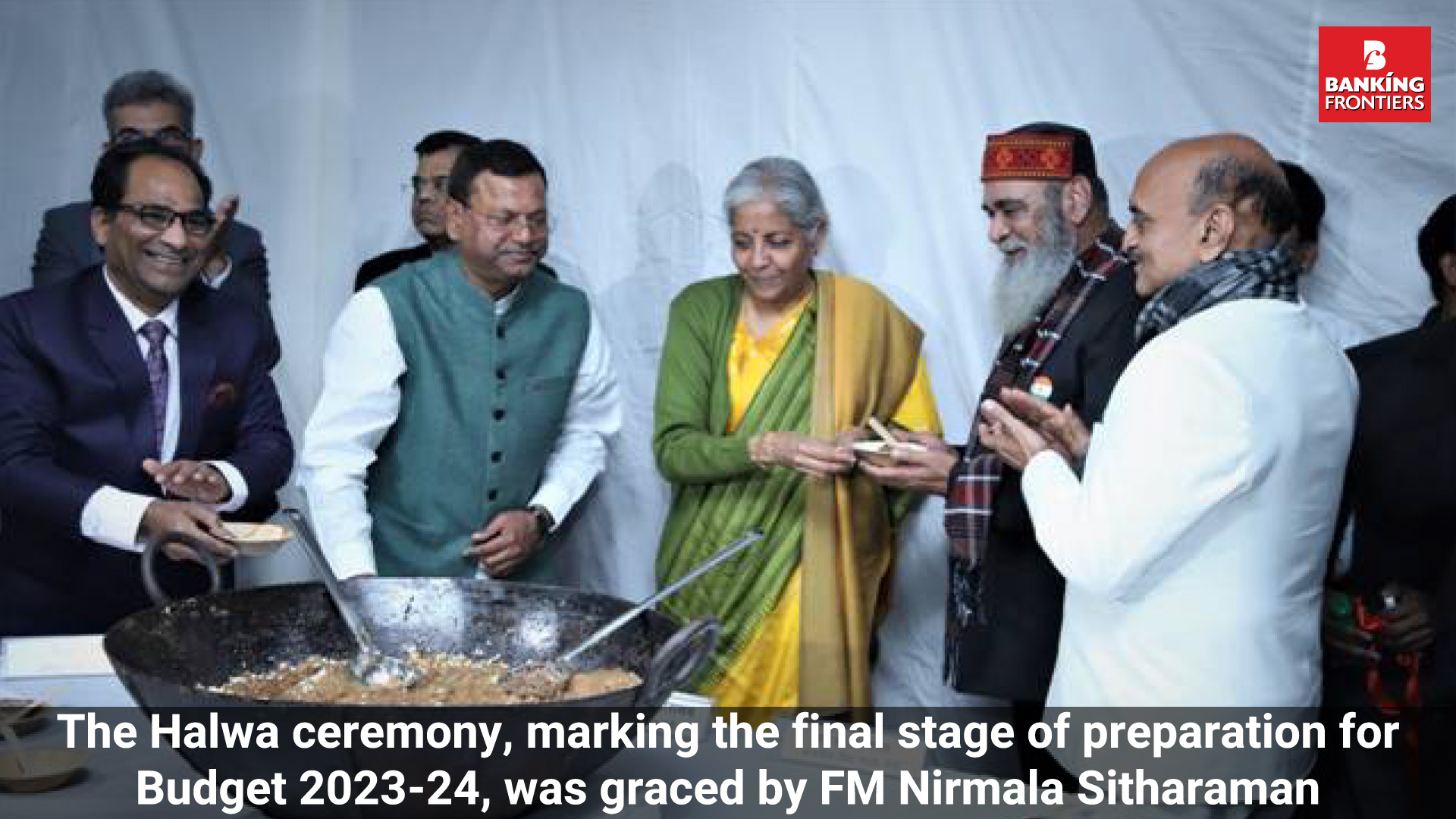
A number of BFSI entities and industry associations have submitted their budget wishlists and detailed recommendations for the 2023-24 Union Budget to Finance Minister Nirmala Sitharaman, who will present it on February 1, 2023. Meanwhile, the Halwa ceremony, symbolizing the completion of budget preparations, was held in North Block with the presence of the FM and Union ministers of state for finance, Pankaj Chaudhary and Dr Bhagwat Kisanrao Karad. All stakeholders eagerly await to see how many of their demands will be met through the budget.
Sonal Badhan, Economist, Bank of Baroda: Budget is unlikely to be a populist one. The government is expected to remain committed to its fiscal glide path announced in the budget for FY22 (<4.5% deficit by FY26), and aims to reduce the fiscal deficit ratio next year by 50 -75 bps to around 5.75%. Working within this framework, the central government will try to balance the task of providing social protection for the weaker section of society, boosting disposable income and giving private investment and state capex a nudge. Revenue growth will also act as a constraint as it moderates from the higher levels achieved in FY23. Thus, to support quality spending, we estimate gross borrowing at Rs 16-17 lakh crore. 10Y G-Sec bond yield is expected to trade between 7.5-7.60% on average in FY24. The government through its budget will aim to give both consumption and investment a nudge. Some tweaking of income tax slabs may be expected. In order to boost investment, the government may opt to continue providing interest-free loans to states for increased capex spending. Subsidies are expected to be rationalised in FY24.
Mahesh Thakkar, Director General, Finance Industry Development Council: If NBFCs are to be regulated like banks, then the typical NBFC model of lending shall suffer which shall impact lending to the unbanked/underbanked segment of society. There is an urgent need to bring harmonization in provisions related to taxation and recovery. Retail loans to individuals / small businesses need to be treated differently as compared to large corporate loans. Smaller loans up to Rs20 million may be permitted to be marked as SMA / NPAs as of month-end. Upgradation in respect of the above loans from NPA to a standard category may be allowed to continue, as hitherto. There is a considerable need to provide adequate financing for the restoration of normalcy and for growth of the educational institutions. Covering these loans under the CGTMSE scheme would facilitate a greater flow of funds to this sector. Arbitration should be recognised as a valid legal remedy for the resolution/recovery of delinquent accounts while processing claims under ECLGS scheme/CGSMSE program. There is a dire need for an effective refinance mechanism to ensure diversity and greater regularity in sources of funds to NBFCs. There is an urgent need to exempt NBFCs from TDS deduction u/s 194A in order to ensure harmonization and remove the ambiguity in co-lending. NBFCs should be exempted from TDS on income from securitisation. The threshold should be reduced from Rs 2 mn to Rs 1 lakh in order to bring NBFCs at par with HFCs, banks, SFBs and other FIs.
Ankur Nijhawan, CEO, AXA France Vie– India Reinsurance Branch: The insurance industry is expecting a combined tax relief of up to Rs1 lakh for health and household insurance. FM should bring basic protection plans under the zero GST mark or tax it in the 5% bracket at the most.
Raghvendra Nath, Managing Director, Ladderup Wealth Management: We hope that the government does not tinker with the capital gain tax on equity or fixed income in an effort to increase revenues. Any further expansion of the borrowing program is anticipated to have a negative effect on the bond markets.
Vijay Malhotra, Co-Founder & Chief Sales Officer, Sahi Bandhu, (gold loan aggregator): Introducing a corporate tax bracket of approximately 15% could aid the service industry to grow and perform beyond expectations. Investments under Section 80C, with the current limit of Rs 1,50,000 needs revision. ESOP holders in Indian startups could gain from the tax being levied on the sale of shares rather than on the exercise of ESOP, which is not the liquidity event for employees of unlisted companies.
Madhusudan Ekambaram, Co-Founder & CEO, KreditBee:
Policy measures towards developing startup clusters, which promote easy access to capital, incubator programs, and federally funded R&D activities will surely assist startups. There should be clearer regulations and streamlining of obtaining licenses. There are certain benefits which are extended to the Inter-Ministerial Board (IMB) certified startups and not the DPIIT-recognised start-ups. Measures towards incentivising ESOPs with simpler and appropriate tax structures would help provide startups with significant wealth creation opportunities while also helping them attract and retain talent. The budget can lay down a good foundation towards providing a clearer path to bring in policy–level changes with respect to IT and data protection bills. The budget can provide measures like reducing or eliminating the loss of input credit, providing liquidity support, access to cheaper credit and encouraging co-lending. Expanding the scope of priority sector lending, extending to the new-to-credit customers in addition to the MFI and education domains will assist the financial inclusion imperative.
Srikanth Kandikonda, CFO, ManipalCigna Health Insurance: We expect the government to announce initiatives to increase the limit for health coverage under section 80D and the GST rate cut to 5% to help millions of people access quality healthcare at an affordable cost.
Kalpana Ajayan, Regional Head, South Asia, Women’s World Banking: We believe that the Union Budget 2023 will reflect all the efforts towards mainstreaming financial inclusion, especially women. If women are kept at the heart of all DBT schemes and delivered through their PMJDY bank accounts, it will encourage women to begin formal savings, adopt insurance and pension products, and build their credit history. It is critical that policy reform for increased adoption and usage of digital public infrastructure among women is built in from the start. The budget must ensure the implementation of the financial capability of girls and women through school curriculum or national campaigns to create financially literate customers.
Ondrej Kubik, CEO, Home Credit India: The major expectation would be the support from the government to take relevant steps towards stepping up liquidity-enhancement measures for NBFCs. We want the government to either create a refinancing body parallel to banks to ensure easier access to funds at a competitive rate compared to the market rate or reintroduce the partial credit guarantee scheme.
Deepak Aggarwal, Co-Founder, Co-CEO, Moneyboxx (NBFC): Further impetus is needed considering that rural India received only 9% share of banking credit despite contributing close to half of the country’s national income. Policies focused on addressing the structural credit gap and measures to boost rural income would be welcome.







